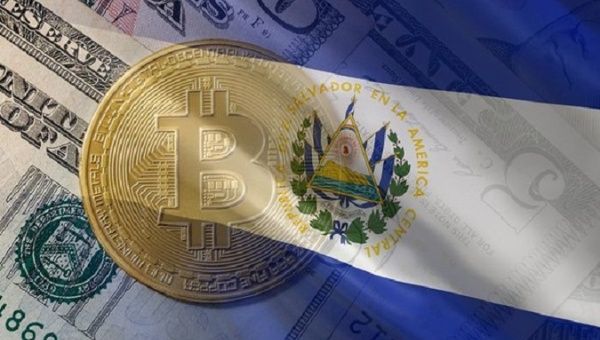
Visual arrangement that includes the flag of El Salvador.
| Photo: Twitter/ @JusBecuze
Published 27 August 2021
Around 77.5 percent of the Salvadoran population considers the adoption of the Bitcoin as a legal tender was not a wise decision.
The Salvadoran Association of International Cargo Transporters (ASTIC) requested the modification of President Nayib Bukele’s Bitcoin Law because it rejects the mandatory use of cryptocurrency as payment.
RELATED:
World Bank Not to Assist El Salvador in Bitcoin Implementation
"No Central American carrier who is hired by a Salvadoran economic agent will accept bitcoins as payment," ASTIC said and explained that carriers will only accept cash.
Arguing that only El Salvador has established Bitcoin as legal tender, the ASTIC pointed out that carriers cannot require customers from other countries to use that cryptocurrency.
The cargo transporters warned they will suspend their services if they do not get a favorable response to their request from Congress and the Presidency. They also pointed out that if the Bukele administration insists on forcing them to receive Bitcoins, the value of all freight charges will be increased by 20 percent.
In June, the Salvadoran Congress approved the “Bitcoin Law”, which should be implemented on Sep. 7. This possibility, however, is being rejected by workers, university students, and transporters, who called for citizen protests on Friday.
Recently, the Francisco Gavidia University's Citizen Studies Center published a poll according to which 77.5 percent of the Salvadoran population considers that the adoption of the Bitcoin as a legal tender was not a wise decision.
Nevertheless, the Bukele administration asked Congress to approve the use of over US$200 million for implementing the cryptocurrency as legal tender. Around US$150 million would go towards a trust that would guarantee the "automatic and instantaneous convertibility" of Bitcoin to dollars and vice versa. Another fraction of the US$200 million budget would be used by the government to provide citizens with a "bonus" to encourage them to use an electronic wallet.
Published 27 August 2021
Around 77.5 percent of the Salvadoran population considers the adoption of the Bitcoin as a legal tender was not a wise decision.
The Salvadoran Association of International Cargo Transporters (ASTIC) requested the modification of President Nayib Bukele’s Bitcoin Law because it rejects the mandatory use of cryptocurrency as payment.
RELATED:
World Bank Not to Assist El Salvador in Bitcoin Implementation
"No Central American carrier who is hired by a Salvadoran economic agent will accept bitcoins as payment," ASTIC said and explained that carriers will only accept cash.
Arguing that only El Salvador has established Bitcoin as legal tender, the ASTIC pointed out that carriers cannot require customers from other countries to use that cryptocurrency.
The cargo transporters warned they will suspend their services if they do not get a favorable response to their request from Congress and the Presidency. They also pointed out that if the Bukele administration insists on forcing them to receive Bitcoins, the value of all freight charges will be increased by 20 percent.
In June, the Salvadoran Congress approved the “Bitcoin Law”, which should be implemented on Sep. 7. This possibility, however, is being rejected by workers, university students, and transporters, who called for citizen protests on Friday.
Recently, the Francisco Gavidia University's Citizen Studies Center published a poll according to which 77.5 percent of the Salvadoran population considers that the adoption of the Bitcoin as a legal tender was not a wise decision.
Nevertheless, the Bukele administration asked Congress to approve the use of over US$200 million for implementing the cryptocurrency as legal tender. Around US$150 million would go towards a trust that would guarantee the "automatic and instantaneous convertibility" of Bitcoin to dollars and vice versa. Another fraction of the US$200 million budget would be used by the government to provide citizens with a "bonus" to encourage them to use an electronic wallet.
All of this would be possible by making a budget modification, which allows Bukele to use US$600 million from a loan granted by the Central American Development Bank (CABEI) for the Trust for the Economic Recovery of Salvadoran Companies (Firempresa).
No comments:
Post a Comment